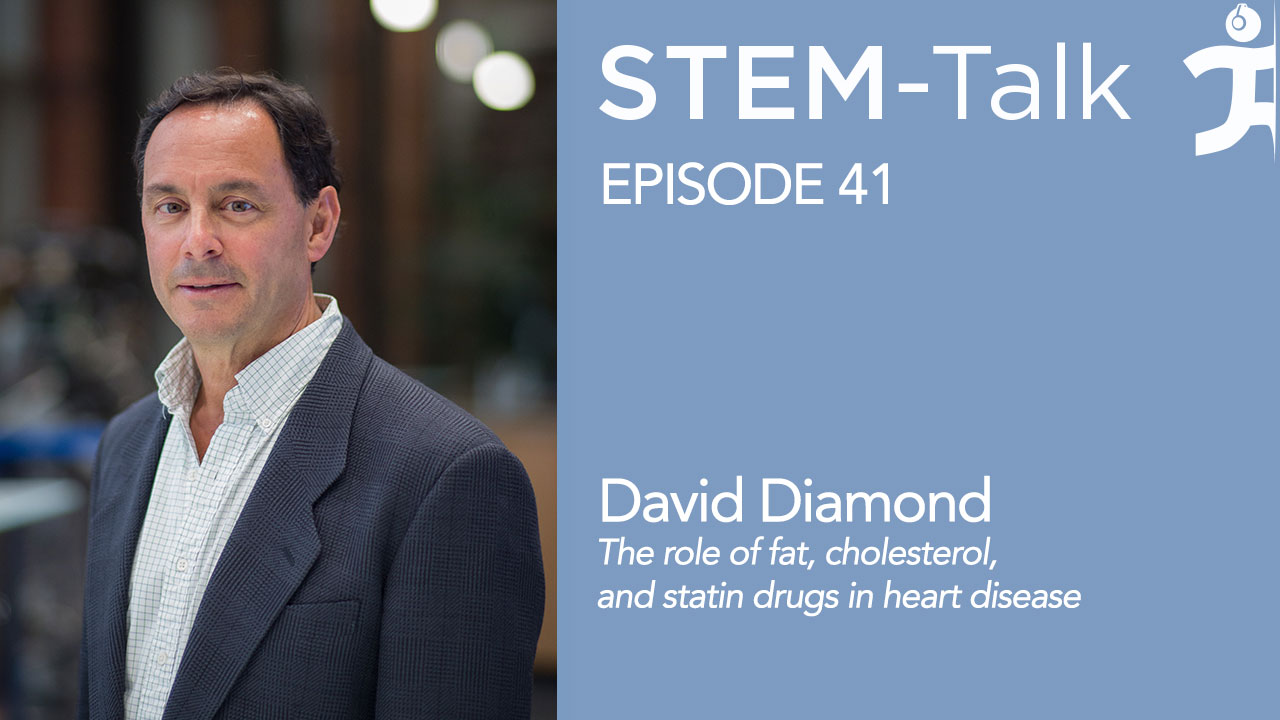STEM-Talk
Episode 41: Dr. David Diamond talks about the role of fat, cholesterol, and statin drugs in heart disease
// Jul 4, 2017

Dr. David Diamond is a University of South Florida professor in the departments of psychology, molecular pharmacology and physiology and director of the USF Neuroscience Collaborative.
He is well known for research that looks at the effects of stress on brain, memory and synaptic plasticity. A primary research project over the past few decades has been the study of treatments for combat veterans and civilians with PTSD.
Although his academic specialty is neuroscience, recently he has been closely examining the role of fat and cholesterol in heart disease. He began looking into lipids after test results showed his triglycerides were through the roof. He also launched a critical look into the effectiveness of statins, a class of drugs doctors frequently prescribe to help people lower cholesterol levels in their blood.
Dr. Diamond’s findings contradicted the low-fat, high-carb diet that he, as well as many Americans, had been advised to follow. This led him to explore ways for people to optimize their diet for cardiovascular health.
He eventually created a graduate and undergraduate seminar entitled, “Myths and Deception in Medical Research.” A lecture he gave at the university entitled “How Bad Science and Big Business Created the Obesity Epidemic” is now a YouTube video with nearly 200,000 views. The lecture focused on how “flawed and deceptive science demonized saturated fats and created the myth that a low-fat, plant-based diet is good for your health.”
Dr. Diamond received his B.S. in biology from the University of California, Irvine in the 1980. He continued his post-graduate work at the university and earned a Ph.D. in biology with a specialization in behavioral neuroscience.
From 1986 to 1997, Dr. Diamond was an assistant professor in the Department of Pharmacology in the University of Colorado Health Sciences Center in Denver. He then moved to University of South Florida and since 2003 has been a professor in the departments of psychology, molecular pharmacology and physiology.
In addition to directing USF’s Neuroscience Collaborative, Dr. Diamond also is the director of the university’s Center for Preclinical and Clinical Research on Post-Traumatic Stress Disorder. His research projects at the university have ranged from “The Effects of Stress on Brain, Memory and Synaptic Plasticity” to “The Cognitive and Neurobiological Perspectives on Why Parents Lose Awareness of Children in Cars.”
Dr. Diamond has served on federal government study sections and committees evaluating research on the neurobiology of stress and memory and has more than 100 publications, reviews, and book chapters on the brain and memory. He is a fellow in the American Institute of Stress and in 2015 he received the award for Outstanding Contribution to Science from the Riga Diabetes and Obesity World Congress. In 2015, Diamond also received the University of South Florida International Travel Award.
Links:
USF lecture: “How Bad Science and Big Business Created the Obesity Epidemic” https://www.youtube.com/watch?v=3vr-c8GeT34
IHMC lecture: “An Update on Demonization and Deception in Research of Saturday Fat, Cholesterol and Heart Disease —https://www.ihmc.us/lectures/20170531/
Show notes:
4:31: Ken and Dawn welcome David to the show.
4:42: Dawn comments on how David has always been interested in science and even wanted to be a physician as a child. She also asks him about majoring in biology and receiving his PhD from the University of California, Irvine.
5:41: Dawn asks David about his varied research topics at the University of South Florida, including cognitive and neurobiological perspectives on why parents lose awareness of children in cars.
7:00: Ken asks David what led him to research cardiovascular disease and statins, since he has such an extensive background in memory and PTSD research.
7:46: Dawn mentions David’s lecture he gave at the University South Florida entitled, “How Bad Science and Big Business Created the Obesity Epidemic”.
9:51: Dawn comments on how David and one of his colleagues recently published a review paper showing that statins have failed to substantially improve cardiovascular outcomes, yet so many doctors continue to prescribe this drug.
10:39: Dawn asks David what additional risks he sees with statins.
11:44: Ken asks David to discuss relative risk versus absolute risk calculations, as there is much confusion around that topic.
13:41: Dawn asks David if there are any ongoing trials looking at the degree of cholesterol lowering and clinical outcomes using absolute risk statistics.
14:39: Dawn discusses the two interwoven stories: one of possible statistical deception and describing the putative benefits of statins, and the other issue of whether there are instances where it makes sense for physicians to prescribe statins. Dawn asks David if there are any subsets of patients that he would recommend treating with statins, and asks about patients with hypercholesterolemia.
16:24: Dawn asks David if there are any other subgroups where the use of statins may be defensible.
17:39: Dawn notes that increased LDL is common in people who start a ketogenic diet while their other biomarkers tend to improve. She asks David to comment on this observation.
18:45: Ken comments on how cholesterol has been so demonized that a lot of people are not aware that our bodies need cholesterol to synthesize the naturally occurring steroids in our systems. Ken then asks David to give an overview of the role that cholesterol plays in our bodies.
19:42: Dawn asks David to talk about some of the dangers of low LDL.
20:54: Ken comments on how an often overlooked aspect of lipoproteins is their role in the innate immune system. Ken then asks David if the medical community should look at lipoproteins from a bit of a broader perspective than simply looking at them as lipid shuttles and a source of cardiovascular disease risk.
22:24: Dawn asks David what actually causes heart disease and what people can do to reduce the risk of having a heart attack.
24:44: Dawn asks David what types of diet or exercise approaches would be optimal for improving cardiovascular health.
29:34: Dawn asks David what an ideal ratio of Omega-6 to Omega-3 is in our diets, and whether or not David thinks this is important.
31:03: Dawn comments on how they have discussed David’s diet and personal routine and asks him what else he incorporates into his personal health regimen.
32:13: Ken asks David what kind of pushback he has received in response to his research findings and lectures.
33:37: STEMTALK BLURB
34:06: Dawn discusses the London Daily Telegram’s story about a group of international experts, including David, who claim that cholesterol does not cause heart disease in the elderly and how trying to reduce it with drugs like statins is a waste of time. The story also points out that these experts’ claims drew immediate skepticism from other academics. Dawn then asks David how he thinks the public deals with conflicting messages like this.
36:25: Ken asks David that assuming his analysis is correct, if he has any thoughts on why errors this large and pervasive continue to persist.
37:14: Ken comments on how we do not often see stories like this in other professions, such as engineering. Ken then asks David what it is about medical research that amends itself to this process.
40:16: Ken comments on how doctors have very prescribed standards of care that they are expected to follow.
41:06: Ken asks David if perhaps the modest benefits of statins could be associated with their recently touted anti-inflammatory properties, rather than primarily their cholesterol lowering effects.
43:07: Dawn comments on how people seem conditioned to think that they can find good health in a pill. She then asks David if this is his experience.
44:00: Dawn notes that in the past people did not place great trust in medicine, however this has certainly changed over time. Dawn then asks David to speculate on why he thinks this is.
45:17: Dawn asks David if it is the right approach when people have an illness or a biomarker that seems wrong and they immediately want to tackle that specific symptom instead of looking at what is causing it.
47:09: Ken asks David if there is any evidence that prescribing statins changes people’s perception of their risk of cardiovascular disease, and thereby changes their behavior in ways that might increase their risk.
48:43: Dawn asks David what he would recommend to patients when their physician says that he or she is going to prescribe statins.
50:10: Dawn asks David what his thoughts are on the effects of statins for exercise performance and muscle strength, in particular how it relates to the aging population.
51:24: Dawn discusses how there seems to be a recent trend to take low doses of a statin drug two to three times a week coupled with zetia. Dawn then asks David what his thoughts are on this, in particular regards to a recent study completed by Johns Hopkins.
53:50: Dawn comments on how there is a greater discussion around precision medicine. She then asks David if there are studies that integrate genetic testing prior to the administration of statins.
55:18: Dawn asks about the Ascot LLA study, the results of which have been promoted extensively through advertising. Dawn asks David to talk about what the results of this study demonstrate and why the study was terminated early.
56:58: Dawn asks David to expand on the Jupiter Study that he discusses in his publication.
57:59: Ken discusses a very new paper titled, Statins for Primary Prevention in Physically Active Individuals: Do the Risks Outweigh the Benefits? The paper examines the potential benefits and adverse events of statins among physically fit individuals, in particular the association of statin use with beneficial cardiovascular outcomes and adverse effects in active duty military personnel. Ken asks David if he has any comments on this paper and its findings.
1:00:51: Ken comments on the new category of drugs called PCSK9 inhibitors. He asks David to talk about this.
1:04:24: Ken asks David to explain how he has been very critical of drug companies in their promotion of statins, yet his neuroscience research has been funded by drug companies.
1:05:25: Dawn asks David what interests he peruses outside of science.
1:06:15: Ken and Dawn thank David for joining them.






